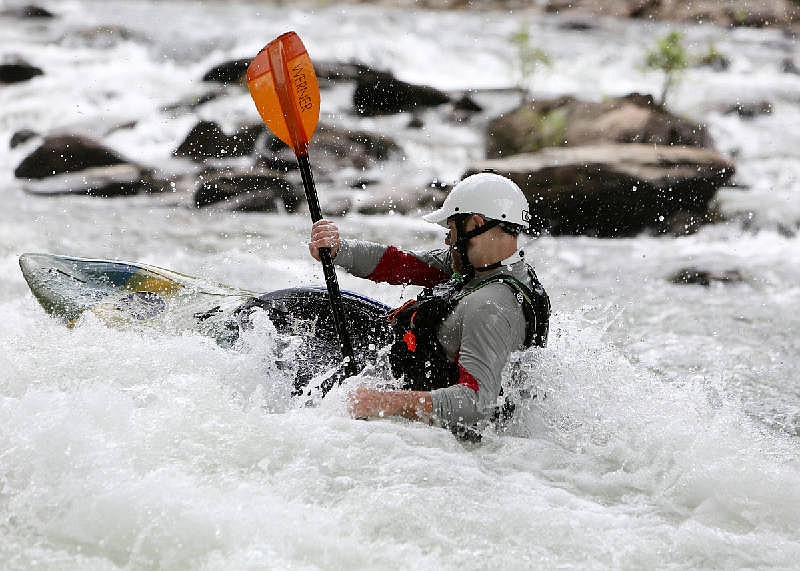One of the last steps to finalize a 15-year agreement that would allow rafting to continue on the Ocoee River began Monday evening with a public meeting.
Representatives from Tennessee Valley Authority, the state of Tennessee, the U.S. Forest Service and rafting companies were at Cleveland State Community College to answer questions about the agreement and an environmental assessment.
"We want to allow the public to have more of a voice and allow them to take more of a part in the decision making," Hiwassee/Ocoee State Park manager Angelo Giansante said. "This will allow them to take a bigger part in what is their river as well."
How to comment
Email: mshigdon@tva.govMail: Matthew Higdon400 West Summit Hill Drive, WT 11D, Knoxville, TN 37902
During much of the year, TVA diverts water from the Ocoee to create power, leaving the river bare. Rafting companies then pay to allow the river to run. The agreement details a plan to compensate TVA for lost power generation. If finalized, TVA would receive $11.78 million from the state, which agreed to cover the cost due to the economic benefits paddling provides the region.
Under the new agreement, rafting companies will pay 10 percent of ticket sales to a new fund that will pay for management and other expenses. In the end, rafting companies will owe between $3.50 and $4.50 more per ticket than they did under previous deal.
The deal came after a long negotiation with all of the involved groups, and funding was approved by Tennessee Gov. Bill Haslam earlier this year.
TVA is free to enter into the contract once the public comment period ends. The state will take the comments into account and then form a new board. Public comments must be received or postmarked no later than Jan. 5, 2018.
TVA considered three alternatives: Alternative A, which would allow the previous agreement to lapse, ending most recreational paddling and commercial rafting on the river; Alternative B, which is the proposed action; and Alternative C, which is similar to Alternative B but would include five additional days of water flow.
The preferred alternative keeps much of the previous deal intact.
"It's the most similar to what we're already doing," Rusty Smith, TVA senior specialist policy and project management, said. "Looking at what we heard during the process, what the outfitters told us they wanted and what the public wanted, we thought this was the best plan."
The draft presented at the meeting evaluates the potential environmental, economical and recreational impacts of rafting in the area. If accepted, it would allow commercial rafting to continue until at least 2034.
TVA found little-to-no impact on the area in the environmental assessment since it is so similar to the previous deal.
However, while much of the agreement remains the same, there are several changes.
"For the outfitters, [the biggest change] will be in the way the payments and funds are used. It will be a whole new experience," Keith Jenkins with Quest Expeditions said.
The state will take over licensing duties from TVA, meaning the federal utility now will mainly be involved in water flow while the state takes over operations.
Also, five weekdays of river flow at the end of each September have been eliminated under the proposed agreement. The days were previously scheduled for maintenance but haven't been used for such for much of the last decade, said Robin Peak with TVA's river management. The utility company now will use those days for power generation.
Members of the Tennessee Valley Canoe Club went to the hearing to learn more about the agreement and expressed concerns about the proposed decision to cut back on recreational days.
"There's not a lot of free-flowing rivers that part of the year, so it's a big draw," club member Paula Haynes said.
She said canoists come from all over the region for the week, sparking an economic impact that would be missed if the days are used for power generation.
However, outfitters didn't request those days as part of the schedule, Peak said, but Haynes and fellow club members Michael Shillinger and Jim Ledbetter want to see non-rafters get more input.
Rafting companies pay a fee to use the river and are part of the negotiation process. The canoe club wants to see private boat owners included more.
"So many of the private boaters that we've talked to wouldn't mind contributing, too, if it would help more water coming down the river," Ledbetter said. "We don't mind paying, but it's not in the system right now. It's as if the private boaters don't count."
Contact staff writer Mark Pace at mpace@timesfreepress.com or 423-757-6361. Follow him on Twitter @themarkpace and on Facebook @ChattanoogaOutdoors.
